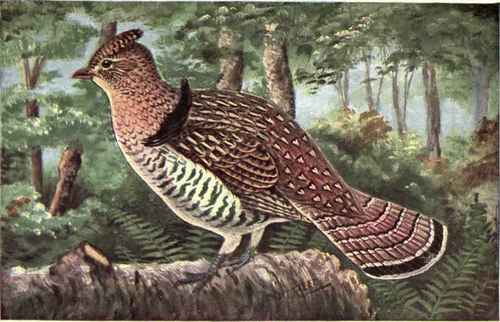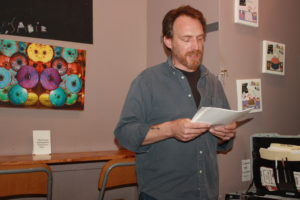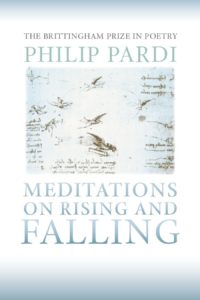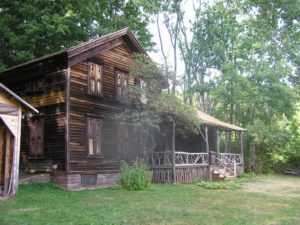(Here’s the bird behind “My Late Mother as a Ruffed Grouse.”)
Woodland hikers in my part of the world (the Northeastern United States) know ruffed grouse as the birds that nearly give us heart attacks when they shoot out of the underbrush like “feathered cannonballs,” as I write in my poem. Mottled brown birds, the size of small chickens, that forage for seeds and bugs on the ground, they’re so well camouflaged that we rarely know they’re present, until they reveal themselves with a “wing beating panic.” Why they don’t remain silent and hidden I don’t know. As they fly off low through the forest, we might, or might not, see the black band on their fanned tail before they vanish in a blur. Field guides offer much better views in illustrations of their intricate brown feather patterns and sharp head crests. Ruffed grouse are quite beautiful in a subtle woodland way.
There’s another signal that couldn’t be more different. In mating season, the males stand on a log and beat the air with their wings, creating a soft drumming that sounds like a muffled outboard motor starting up then puttering out. I heard this noise for years before learning what it was. A banging tree branch? A raccoon having a coughing fit? I never would have guessed a bird call. But it’s an invitation, the antithesis of the “wing beating panic.” Yet I haven’t been able to sneak up on a drumming grouse, no matter how close the bird sounds.
Did my mother have a fondness for ruffed grouse? Probably not. She birded in her suburban backyard or at the beach near her house in Connecticut or by the ponds and shoreline of Mount Desert Island, her summer vacation spot. I have her old field guide with her margin notes that date and locate sightings of loons, herons, ducks, rails, and others. She did see a ring-necked pheasant on June 27, 1987, on a hill by the beach in Connecticut. But she wrote nothing beside “ruffed grouse.” If she had her choice, she might have returned as a shorebird, but to find me in the mountains, she became a ruffed grouse.
These birds aren’t common in poetry. At readings I’ve found that many listeners aren’t familiar with them. There’s also a common urge to call them ruffled grouse, instead. (The word ruffed refers to the dark feathers around the neck which flare out when the bird displays itself.) Unlike owls or crows, ruffed grouse lack a mythical charisma that might make them more popular in poems. But here’s one that gives me hope that my late mother will meet a soul mate in her new life. It’s by Paul Zimmer from Crossing to Sunlight Revisited published by the University of Georgia Press.
Because I Am Heir To Many Things
warmth of dandelion, shamble of bear,
caution of inchworm, brain of flicker,
I am not surprised when, ankle-deep
in snow among February woods,
I feel suddenly aroused by a sound
like a wooden spoon rattling a bucket.
But it is just another brother, a grouse,
confused and drumming on a hollow log,
like an old man dreaming he is young again,
wishing for love in a preposterous season.





